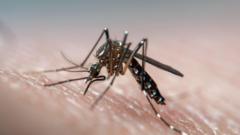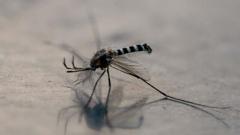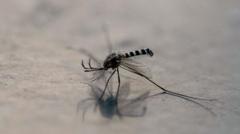Scientists from the University of California are pioneering an unconventional method to combat mosquito-borne illnesses such as dengue fever by making male mosquitoes deaf, ultimately disrupting their mating process.
Deaf Mosquitoes: A Novel Approach in Battling Mosquito-Borne Diseases

Deaf Mosquitoes: A Novel Approach in Battling Mosquito-Borne Diseases
Researchers innovate a genetic technique to create non-mating male mosquitoes, potentially curbing diseases like dengue and Zika.
In a groundbreaking study, a research team at the University of California, Irvine, has discovered a unique strategy to reduce the populations of disease-spreading mosquitoes like Aedes aegypti—famous for transmitting viruses affecting millions globally—by rendering male mosquitoes incapable of hearing. This innovative approach aims to hinder mating interactions between male and female mosquitoes, which are essential for reproduction.
Through genetic alteration, the researchers focused on a specific protein known as trpVa, integral to the auditory function of these insects. By knocking out this gene, the altered male mosquitoes exhibited no responses to the wingbeats or flight tones emitted by females, crucial signals that male mosquitoes rely on to locate and court their partners. After extensive observation, the team noted that these modified males failed to engage in mating behavior, marking a revolutionary achievement in the quest to diminish mosquito populations.
Findings published in the journal PNAS illustrate that while wild male mosquitoes actively mated with multiple females, the genetically modified counterparts did not mate at all, presenting an "absolute" failure in reproduction. Dr. Joerg Albert, an expert in mosquito mating behaviors from the University of Oldenburg in Germany, acknowledged the potential of targeting auditory capabilities for mosquito control. He emphasized that although this approach shows promise, further scrutiny and management are necessary, as the absence of male hearing could lead to a decline in the species.
In addition to this method, researchers are exploring the viability of releasing sterile males into regions plagued by mosquito-borne diseases as an alternative control strategy. It is critical to balance these methods with ecological considerations, as mosquitoes play significant roles in the ecosystem, serving as food for numerous animals and even aiding in pollination efforts.
This innovative direction in mosquito research could represent a significant step toward reducing the prevalence of serious health threats posed by these pests and offers insights into how genetic engineering could emerge as a viable tool in addressing global health challenges linked to climate change.
Through genetic alteration, the researchers focused on a specific protein known as trpVa, integral to the auditory function of these insects. By knocking out this gene, the altered male mosquitoes exhibited no responses to the wingbeats or flight tones emitted by females, crucial signals that male mosquitoes rely on to locate and court their partners. After extensive observation, the team noted that these modified males failed to engage in mating behavior, marking a revolutionary achievement in the quest to diminish mosquito populations.
Findings published in the journal PNAS illustrate that while wild male mosquitoes actively mated with multiple females, the genetically modified counterparts did not mate at all, presenting an "absolute" failure in reproduction. Dr. Joerg Albert, an expert in mosquito mating behaviors from the University of Oldenburg in Germany, acknowledged the potential of targeting auditory capabilities for mosquito control. He emphasized that although this approach shows promise, further scrutiny and management are necessary, as the absence of male hearing could lead to a decline in the species.
In addition to this method, researchers are exploring the viability of releasing sterile males into regions plagued by mosquito-borne diseases as an alternative control strategy. It is critical to balance these methods with ecological considerations, as mosquitoes play significant roles in the ecosystem, serving as food for numerous animals and even aiding in pollination efforts.
This innovative direction in mosquito research could represent a significant step toward reducing the prevalence of serious health threats posed by these pests and offers insights into how genetic engineering could emerge as a viable tool in addressing global health challenges linked to climate change.











